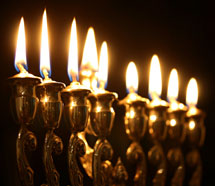
Is Hanukkah merely a holiday telling us a heroic story of battles won and political victories gained, like the American Fourth of July or the French Fourteenth of July? A political event, even one of the greatest importance, can be celebrated only as long as the people view it as a turning point in history, the beginning of a new epoch in independence, and so long as one still enjoys that independence, as, for example, Independence Day in America.
However, a political victory loses its meaning when the people later lose their independence and the victory ends in a downfall. If Hanukkah had been simply a holiday of political freedom, its whole meaning would have evaporated with the destruction of the Temple and the exile of the Jewish people.
Where is the logic in celebrating Hanukkah during thousands of years of exile, martyrdom, ghettos, pogroms, and suffering? Could one celebrate a holiday of political freedom when the condition of Jews was the very opposite of freedom and independence? How small and worthless do the Maccabean victories seem when compared to the cruel political downfalls that we have suffered?
The Talmud states: “Megillat Ta’anit has been annulled … But Hanukkah is different because there was then a public demonstration of God’s miracle” (Rosh ha-Shanah l8b). Hanukkah is celebrated today, and that is a sign that the holiday, and its commemoration of God’s miracles, belongs to the group of Jewish holidays that have Passover as their pinnacle. These holidays are based on an everlasting value, which no political destruction or military downfall can erase.
If the Halakhah chose to establish Hanukkah as a holiday to be observed whether or not the Temple stands, that is a sign that the Hanukkah that exists for generations, like Passover, holds within it the secret of the eternity of Israel. The Hanukkah of political freedom, so popular with all, was annulled long ago with the destruction of the Temple, like all the other holidays of the Second Temple era that were mentioned in Megillat Ta’anit. It would seem, then, that the greatness of Chanukah consists not so much in the importance of the miracles that occurred ba-yamim ha-hem, in the days of yore, over two thousand years ago, but most importantly ba-zman ha-zeh, in our times, in the meaning of the ancient miracle for the here-and-now, which no destruction can annul or diminish.
Actually, there is a general misconception about the motivation for the Hasmonean uprising. The revolt of Matityahu the High Priest and his sons was not a response to political pressure. From the time of Ezra until that of Matityahu, the kingdom of Israel had never been politically independent. In the beginning it was under the influence of Persia, then of Egypt. Later it was part of Alexander the Great’s empire, and after his death it came under Syrian-Greek sovereignty. If the only issue had been political sovereignty, the revolt would never have broken out; the Jews would have continued to accept their suffering “with love” and would have waited for the eventual complete redemption.
The conflict with the Greeks was a different matter entirely. The Greeks hated the Jews’ spiritual essence, their worldview, their peculiarity, their being different—in short, their Torah. The motive for their hatred was Haman’s complaint: “Their laws are different from those of every people” (Esther 3:8); “they depart from the laws of the king to observe their own” (Megillat ha-Chashmonaim 7). Therefore, the Greeks were not satisfied with political pressure. They began to meddle with the intimate realm of human life, the Jewish people’s connection to God, and began to conduct their battle on a new ground: that of religion.
It was this persecution of religion that distressed the Hasmoneans and fanned the flames of battle. Our Sages put it well: “What is [the reason for] Hanukkah? … When the Greeks entered the sanctuary, they defiled all the oil that was there …” (Shabbat 21b). The reason for the great revolt was the Greeks’ entering the sanctuary, the Jewish Temple, and defiling all the oil, bringing in their pagan cult and weakening the holiness of Israel—its Sabbath, its laws of modesty and family purity. The war broke out because of the Temple, not only because of political freedom.
This being the case, the victory did not consist so much in political achievements as in religious freedom, in the purification of the Temple and re-kindling the eternal Jewish light: “And thereupon Your children came into the sanctuary of Your house, and cleansed Your Temple, and purified Your sanctuary, and kindled lights in Your holy courtyards” (Al ha-Nissim). It is true that political freedom was also achieved, but that was not the major point. The political holiday was the temporary Hanukkah; the Hanukkah for generations is a holiday of purifying the Temple and of lighting candles.
Excerpted from Days of Deliverance: Essays on Purim and Hanukkah by Rabbi Joseph B. Soloveitchik.
More information on the book can be found here: OU Press
The words of this author reflect his/her own opinions and do not necessarily represent the official position of the Orthodox Union.



